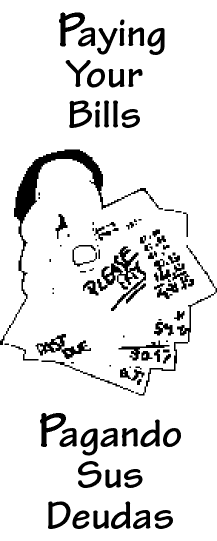Paying Your Bills - Consumers in Debt Series
A fact sheet that explains the importance of paying your bills on time, and how your history of payments affects your credit rating. Also discusses credit contracts, especially retail installment contracts, and credit cards.

This document may also be available in the following languages: Chinese, English, Korean, Russian, Spanish, and Vietnamese, among others. An Adobe Acrobat (pdf) file (optimized for printing) may also be available in some or all of the above languages. To see what languages and formats this document is currently available in, please check our online Multilingual Library.
Note: Last revision 1992. Use this information as a general guide only; consult with a local consumer group for laws specific to your state.
Paying Your Bills
It is important to pay your bills when they are due. Paying late will hurt your credit rating. If you are slow in paying your bills, credit will cost more. Also credit will be harder to get.
Always mail a payment early enough for the creditor to get it by the due date. The due date is printed on your bill. By law a payment must be recorded when it is received. If a bill has been mailed, but not received by the due date, it is late.
Late or Unpaid Credit Card Payments
Read your credit contract carefully to learn what will happen if a payment is late or not made.
You may have to pay a late fee. The amount of the late fee depends on the credit agreement and the kind of credit used. Many credit cards charge $10 to $20 for a late fee. For some other types of credit the charge may be more. For example, for a late house payment, you may be charged $50. However, for a retail installment contract (used to buy things such as furniture or appliances) under the Florida law the fee can't be more than five percent of the payment due.
With some credit contracts the total unpaid balance of the debt comes due. For example: suppose you miss a car payment. You might have to pay the total amount you still owe or the car will be repossessed.
With credit cards, interest is added for the period of non-payment. Some credit cards also add interest from the date purchases were posted during the previous month. You lose the grace period on purchases made during the month.
Monthly Credit Card Bills
With credit cards, you receive a periodic (monthly) bill. The bill lists all purchases and payments. You may pay the total amount of the bill. Or, you can pay a-stated minimum amount. If possible pay the total amount. If you can't pay it all, be sure to pay the minimum amount. The quicker you pay, the less interest you will have to pay.
The total amount of your monthly credit card bill depends on how much you have charged. The amount due is different each month. The minimum payment is a percentage of the unpaid balance. The minimum amount is different each month.
Retail Installment Contracts
Retail installment contracts are used to buy things and pay for them over a stated time (example: one year). The payment is the same amount each month. You usually are given a "payment book" and do not get a bill each month. You must take a receipt out of the book each month and send it along with your payment to the creditor.
Credit Reporting Agencies
The credit reporting agency keeps a record of who you owe and how much. It also keeps a record of how prompt you are in paying. When you apply for credit the creditor will check your record. If you pay you bills promptly you will be able to get the credit you need. If you are slow to pay, you may have trouble getting credit.
Copyright, Credits & Usage
© Copyright 1992 Home Economics Department, Institute of Food and Agricultural Sciences, University of Florida, Gainesville
Funded by the National Coalition for Consumer Education and AT&T Consumer Credit Education Fund
Electronic publication produced by Consumer Action
Electronic publication funded by AT&T Universal Card
Published / Reviewed Date
Published: April 01, 1992
Download PDF
No Download Available
Sponsors
Filed Under
Copyright
© 1992 –2024 Consumer Action. Rights Reserved.



